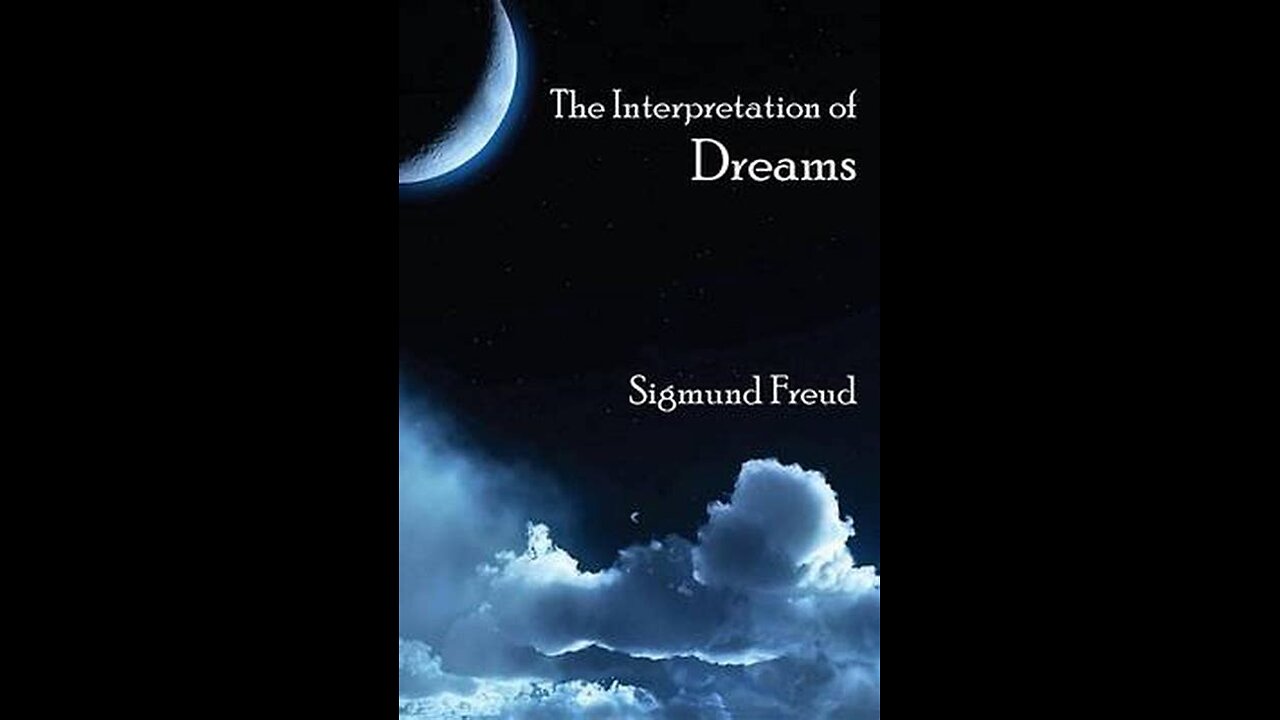Premium Only Content

The Interpretation of Dreams by Sigmund Freud | Summary and Critique
Buy Here: https://amzn.to/46PS36M
"""The Interpretation of Dreams"" is a seminal work written by Sigmund Freud, the founder of psychoanalysis, and published in 1899. In this book, Freud presents his theory of dreams and explores their significance in understanding the unconscious mind. He argues that dreams are the ""royal road"" to the unconscious and provides a framework for interpreting their symbolic content.
Freud begins by discussing the nature of dreams and their characteristics, emphasizing their symbolic nature and the presence of unconscious desires and conflicts. He introduces the concept of the ""dream-work,"" which refers to the mechanisms through which dreams are formed, such as condensation (combining multiple elements into a single image) and displacement (redirecting emotional intensity from one object to another).
According to Freud, dreams fulfill both manifest and latent functions. The manifest content refers to the literal events and images experienced in a dream, while the latent content represents the underlying unconscious wishes, desires, and conflicts symbolically expressed in the dream. Freud argues that through the analysis of these symbols, one can gain insight into the unconscious motivations and conflicts that shape an individual's thoughts and behaviors.
Freud also explores the role of childhood experiences, particularly repressed or unresolved conflicts, in the formation of dreams. He argues that dreams provide a safe outlet for the expression of repressed desires and wishes that may be unacceptable or inaccessible to the conscious mind. Through dream analysis, individuals can gain self-understanding and potentially work through unresolved psychological issues.
Critique of ""The Interpretation of Dreams"" includes the following points:
1. Lack of Empirical Evidence: Critics argue that Freud's theories, including his interpretation of dreams, are based largely on introspection and clinical observations, lacking strong empirical evidence. They contend that the subjective nature of dream analysis makes it difficult to establish universal principles or objective interpretations.
2. Overemphasis on Sexual and Aggressive Content: Some critics claim that Freud places excessive emphasis on sexual and aggressive themes in dream interpretation, potentially overlooking other potential meanings and symbols. They argue that this narrow focus may limit the richness and complexity of dream analysis.
3. Limited Generalizability: Critics argue that Freud's theories may not be applicable to all individuals or cultures. The interpretation of dreams may vary depending on individual experiences, cultural backgrounds, and personal contexts, challenging the universality of Freud's claims.
4. Reductionist Approach: Freud's emphasis on unconscious sexual and aggressive desires as the primary motivators of human behavior has been criticized for oversimplifying the complexity of human psychology. Critics argue that it neglects other important factors such as social, cultural, and environmental influences on human thoughts and behaviors.
5. Lack of Falsifiability: Some critics argue that Freud's theories, including dream interpretation, are difficult to test or falsify, making them less scientifically rigorous. The subjective nature of dream analysis and the reliance on personal interpretation make it challenging to establish objective criteria for evaluating Freud's claims.
Despite these critiques, ""The Interpretation of Dreams"" remains a groundbreaking and influential work in the field of psychology. Freud's emphasis on the unconscious mind and the exploration of symbolism in dreams have had a lasting impact on psychoanalysis and our understanding of human psychology. The book continues to be studied and debated, inspiring further research and interpretations of dreams and the unconscious."
-
 17:17
17:17
Lady Decade
23 hours ago $2.78 earnedMortal Kombat Legacy Kollection is Causing Outrage
12.6K6 -
 35:51
35:51
Athlete & Artist Show
1 day ago $6.58 earnedIs Ryan Smith The Best Owner In The NHL?
25.9K2 -
 22:56
22:56
American Thought Leaders
1 day agoCharles Murray: I Thought Religion Was Irrelevant to Me. I Was Wrong.
18.2K5 -
 36:22
36:22
Brad Owen Poker
5 hours agoGIGANTIC $17,000+ Pot In BOBBY’S ROOM! TRAPPING Top Pro w/FULL HOUSE!! Big Win! Poker Vlog Ep 326
23.5K -
 3:53
3:53
NAG Daily
22 hours agoRUMBLE RUNDOWN: DREAM HACK SPECIAL W/Greenman Reports
15.5K6 -
 1:28
1:28
Damon Imani
1 day agoThey Laughed at Trump’s Cognitive Test — Damon Made Them REGRET It!
25.1K9 -
 9:14
9:14
Freedom Frontline
1 day agoAdam Schiff PANICS As Eric Schmitt Exposes His Dirty Lies LIVE
16.5K14 -
 10:32
10:32
GBGunsRumble
1 day agoGBGuns Armory Ep 153 Adler Arms AD-9`
11.4K2 -
 35:53
35:53
Degenerate Plays
4 hours ago $0.37 earnedRuckus Randy And Repair Ronald (Socks On) - Call of Duty: Modern Warfare 2 (2009) : Part 7
7.23K1 -
 38:35
38:35
Stephen Gardner
1 day ago🔥What JUST leaked out of Congress. PROVES Trump RIGHT!!
100K138